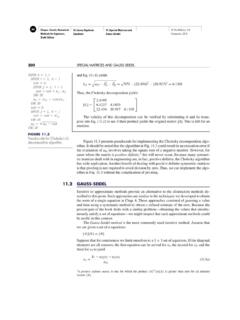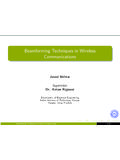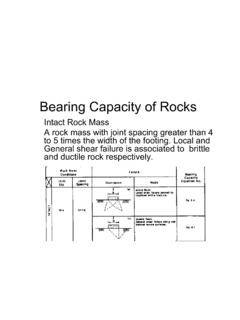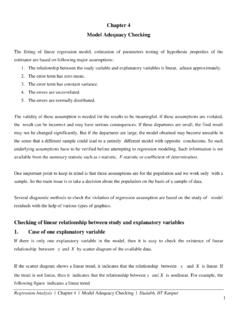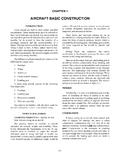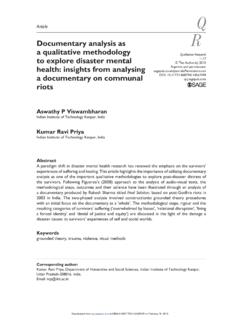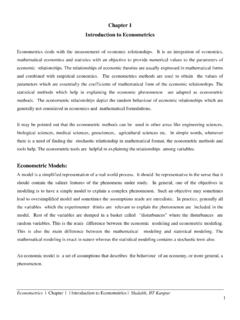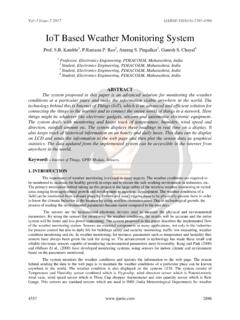Transcription of WASTE MANAGEMENT INITIATIVES IN INDIA FOR …
1 European Scientific Journal June 2015 /SPECIAL/ edition ISSN: 1857 7881 (Print) e - ISSN 1857- 7431 105 WASTE MANAGEMENT INITIATIVES IN INDIA FOR HUMAN WELL BEING Dr. Raveesh Agarwal Professor and Head, Department of Business Administration, Rajshree Institute of MANAGEMENT & Technology, Bareilly Mona Chaudhary Associate Professor, Department of MANAGEMENT Amity University, Noida Jayveer Singh MBA Student, Rajshree Institute of MANAGEMENT & Technology, Bareilly Abstract The objectives of writing this paper is to study the current practices related to the various WASTE MANAGEMENT INITIATIVES taken in INDIA for human wellbeing. The other purpose is to provide some suggestions and recommendations to improve the WASTE MANAGEMENT practices in Indian towns.
2 This paper is based on secondary research. Existing reports related to WASTE MANAGEMENT and recommendations of planners/NGOs/consultants/government accountability agencies/key industry experts/ for improving the system are studied. It offers deep knowledge about the various WASTE MANAGEMENT INITIATIVES in INDIA and find out the scope for improvement in the MANAGEMENT of WASTE for the welfare of the society. The paper attempts to understand the important role played by the formal sector engaged in WASTE MANAGEMENT in our country. This work is original and could be further extended. Keywords: INDIA , Recycling, WASTE Disposal, WASTE MANAGEMENT Introduction There are few things certain in life one is death, second is change and the other is WASTE .
3 No one can stop these things to take place in our lives. But with better MANAGEMENT we can prepare ourselves. Here we will talk about WASTE and WASTE MANAGEMENT . Each of us has a right to clean air, water and food. This right can be fulfilled by maintaining a clear and healthy environment. Now for the first question, what is WASTE ? Any material which is not needed by the owner, producer or processor is WASTE . Generally, WASTE is defined as at the end of the product life cycle and is disposed of in European Scientific Journal June 2015 /SPECIAL/ edition ISSN: 1857 7881 (Print) e - ISSN 1857- 7431 106 landfills. Most businesses define WASTE as anything that does not create value (BSR, 2010).
4 In a common man s eye anything that is unwanted or not useful is garbage or WASTE . However scientifically speaking there is no WASTE as such in the world. Almost all the components of solid WASTE have some potential if it is converted or treated in a scientific manner. Hence we can define solid WASTE as Organic or inorganic WASTE materials produced out of household or commercial activities, that have lost their value in the eyes of the first owner but which may be of great value to somebody else. (Robinson, ). Generation of WASTE is inevitable in every habitation howsoever big or small. Since the dawn of civilization humanity has gradually deviated from nature & today there has been a drastic change in the lifestyle of human society.
5 Direct reflection of this change is found in the nature & quantity of garbage that a community generates. We can dispose the WASTE or reuse the WASTE and can earn money through proper MANAGEMENT . Indian cities which are fast competing with global economies in their drive for fast economic development have so far failed to effectively manage the huge quantity of WASTE generated. There are about 593 districts and approximately 5,000 towns in INDIA . About percent of INDIA s total population of more than 1 billion (as per Census 2001) lives in urban areas. The projected urban population percentage is percent by the year 2026. The quantum of WASTE generated in Indian towns and cities is increasing day-by-day on account of its increasing population and increased GDP.
6 The annual quantity of solid WASTE generated in Indian cities has increased from six million tons in 1947 to 48 million tons in 1997 with an annual growth rate of percent, and it is expected to increase to 300 million tons by 2,047 (CPCB, 1998). Population explosion, coupled with improved life style of people, results in increased generation of solid wastes in urban as well as rural areas of the country. In INDIA like all other sectors there is a marked distinction between the solid WASTE from urban & rural areas. However, due to ever-increasing urbanization, fast adoption of use & throw concept & equally fast communication between urban & rural areas the gap between the two is diminishing.
7 The solid WASTE from rural areas is more of a biodegradable nature & the same from urban areas contains more non-biodegradable components like plastics & packaging. The repugnant attitude towards solid WASTE & its MANAGEMENT is however, common in both the sectors. Universally making garbage out of sight is the commonly followed practice. In INDIA , the urban local bodies, popularly known as the municipal corporations/councils, are responsible for MANAGEMENT of activities related to public health. However, with increasing public and political awareness as well as new possibilities opened by economic growth, solid WASTE European Scientific Journal June 2015 /SPECIAL/ edition ISSN: 1857 7881 (Print) e - ISSN 1857- 7431 107 MANAGEMENT is starting to receive due attention.
8 The various INITIATIVES taken by government, NGOs, private companies, and local public drastically increased in the past few decades. Nonetheless, land filling is still the dominant solid WASTE MANAGEMENT option for the United States as well as many other countries like INDIA around the world. It is well known that WASTE MANAGEMENT policies, as they exist now, are not sustainable in the long term. Thus, WASTE MANAGEMENT is undergoing drastic change to offer more options that are more sustainable. We look at these options in the hope of offering the WASTE MANAGEMENT industry a more economically viable and socially acceptable solution to our current WASTE MANAGEMENT dilemma. This paper outlines various advances in the area of WASTE MANAGEMENT .
9 It focuses on current practices related to WASTE MANAGEMENT INITIATIVES taken by INDIA . It also highlights some INITIATIVES taken by the US federal government, states and industry groups. The purpose of this paper is to gain knowledge about various INITIATIVES in both countries and locate the scope for improvement in the MANAGEMENT of WASTE . Classification of WASTE There may be different types of WASTE such as Domestic WASTE , Factory WASTE , WASTE from oil factory, E- WASTE , Construction WASTE , Agricultural WASTE , Food processing WASTE , Bio-medical WASTE , Nuclear WASTE , Slaughter house WASTE etc. We can classify WASTE as follows: Solid WASTE - vegetable WASTE , kitchen WASTE , household WASTE etc.
10 E- WASTE - discarded electronic devices such as computer, TV, music systems etc. Liquid WASTE - water used for different industries, tanneries, distilleries, thermal power plants Plastic WASTE - plastic bags, bottles, bucket, etc. Metal WASTE - unused metal sheet, metal scraps etc. Nuclear WASTE - unused materials from nuclear power plants Further we can group all these types of WASTE into wet WASTE (Biodegradable) and dry WASTE (Non Biodegradable). Wet WASTE (Biodegradable) includes the following: Kitchen WASTE including food WASTE of all kinds, cooked and uncooked, including eggshells and bones Flower and fruit WASTE including juice peels and house-plant WASTE Garden sweeping or yard WASTE consisting of green/dry leaves Sanitary wastes Green WASTE from vegetable & fruit vendors/shops WASTE from food & tea stalls/shops etc.

